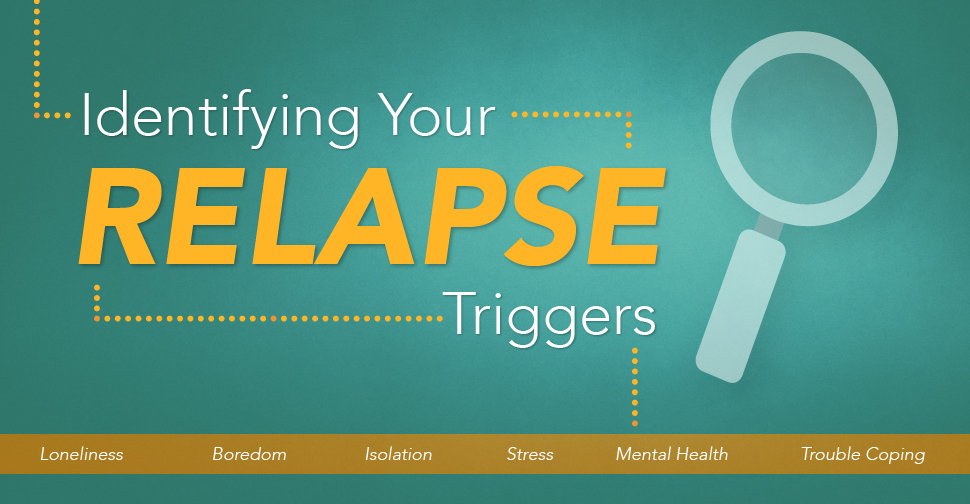
Recovery takes a great deal of patience, restraint, and diligence. It takes courage to seek treatment, follow through with detoxification, and make the changes necessary to maintain sobriety. With all of this effort relapse is still an unfortunate possibility. The National Institute on Drug Abuse suggests that 40-50% of drug and alcohol addictions will be revisited following a rehabilitation program. While the reasons for this discouraging statistic vary the likelihood of relapse can be lessened by identifying and counteracting relapse triggers.
Common Relapse Triggers
While in recovery for addiction many worry about the possibility of relapse. Some fall back on addictive substances immediately while others maintain sobriety for a great deal of time. People relapse for a variety of reasons and understanding common triggers may help you prevent relapse in the future. Some common relapse triggers include:
- Isolation, boredom, and loneliness following rehabilitation.
- Returning to enabling relationships.
- Trouble coping with significant life changes, such as death, divorce, legal trouble, or injury.
- Preexisting mental health disorders.
- Stressful work situations, heated arguments, and financial distress.
Avoiding these situations may prove difficult in some cases. Certain triggers are spontaneous while others become more overwhelming as time passes. Managing stress without substances can create a great deal of temptation for those in recovery. Thankfully there are methods of planning for instances of greater temptation.
Counteracting Temptation
Sobriety can be hard to manage sometimes. When addiction becomes a way of life, it can take time to find new ways of combating temptation. The very first step in preventing relapse is to ask yourself what it would take to give in. Many feel more tempted to relapse in a situation that is too hard to manage. Some methods of resisting temptation include:
- Avoiding people and places in which substances are easily obtained.
- Take time to process situations and try to think of all possible solutions.
- Seek counsel from people you trust. Ask for help from a friend, family member, sponsor, or sober living coach.
- Keep resources on stand-by in the event that relapse has, or may, occur.
- List triggers and develop a plan of action for each possible scenario.
- Try not to dwell on the anxiety of possible relapse.
- Continue with treatment plans, therapy, and medications.
Temptation is a large factor in many relapses. The desire to find relief can be greater than restraint and some circumstances feel too overwhelming to overcome. When relapse does occur some believe that rehabilitation has failed and there is no point in continuing treatment for addiction. In the event of relapse there are ways to continue with treatment and get back on track.
What If I Relapse?
When relapse occurs a flurry of emotions can surface. Disappointment, guilt, and desperation often lead people to fall back into old habits. Thankfully relapse is not the end for those in recovery. While it’s not easy accepting relapse as a mistake is the first step in reestablishing sobriety and getting back on the right track. When relapse occurs, consider the following options:
- Contact a sponsor, sober living coach, or a trusted friend.
- Remove yourself from the situation as soon as it is safe.
- Consider further treatment options to reinforce recovery.
- If treatment is physician-guided, seek counsel for additional treatment support.
- Document your thought process and consider alternative coping methods.
While this is a necessary investment in lasting sobriety, many feel overwhelmed with the prospect of returning to addiction after the relief of recovery. If preventative measures are not enough to combat temptation, it can be an opportunity to reevaluate triggers and reform your routine. A plan of action can make all of the difference in the event of relapse.
Self-Inventory
When drugs or alcohol become a way of life, it may be difficult to pinpoint specific triggers. But becoming aware of your habits, interactions, surroundings, and reactions can make all of the difference in preventing relapse. Preparing for possible temptation through trigger identification is a positive method of staying sober and maintaining control over your recovery.
We Can Help
 Sobriety is a long process with many rewards. Knowing your triggers and developing a strategy to combat relapse can make this process easier. If you, or someone you know needs help with relapse prevention, the caring staff at DrugRehab.org is here to help. We can guide you through your triggers, help develop a plan of action, and assist in getting back on track after a relapse. Contact us today.
Sobriety is a long process with many rewards. Knowing your triggers and developing a strategy to combat relapse can make this process easier. If you, or someone you know needs help with relapse prevention, the caring staff at DrugRehab.org is here to help. We can guide you through your triggers, help develop a plan of action, and assist in getting back on track after a relapse. Contact us today.

